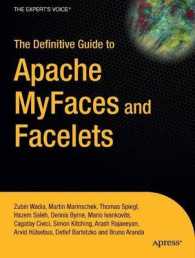- ホーム
- > 洋書
- > 英文書
- > Computer / General
Full Description
Information Science is concerned with the theoretical and practical aspects of effective information provision and consumption. In particular, information scientists explore the theoretical underpinnings and practical competencies involved in the generation, collection, organization, processing, management, storage, retrieval, distribution, communication, and utilization of information.
In today's knowledge societies (shaped, in the words of the editors of this new Routledge title, 'by an unabatedly accumulating abundance of information'), it is perhaps unsurprising that Information Science is more than ever a crucial site for scholarly exploration. And as serious research in and around the discipline flourishes as never before, this four-volume collection from Routledge's acclaimed Critical Concepts in Media and Cultural Studies series meets the urgent need for an authoritative reference work to make sense of a rapidly growing and ever more complex corpus of interdisciplinary literature. Edited by two leading scholars of international repute, Information Science gathers foundational and canonical work, together with more innovative and cutting-edge scholarship.
Volume I brings together the best and most influential materials to provide a wide-ranging critique of the theoretical framework and historical context of Information Science. Starting with the changing definitions, concepts, and roles of information throughout history, the major works gathered here examine the nature of Information Science as a discipline, including an exploration of its philosophy and core mission; its intellectual content and concerns; its scope and boundaries; and an appraisal of how libraries, information services, and information management evolved over the years.
Volume II assembles the essential thinking on the management of information for its optimum accessibility and usability. It encompasses the entire chain of information (the process through which recorded knowledge is transmitted from its originator to the consumer). The crucial research brought together here also considers the vast array of information products, systems, and services on offer and the principal agents for the provision of knowledge in our age of omnipresent information, including: governmental, scholarly, commercial, and individual content providers; publishers; and traditional and virtual libraries.
Volume III, meanwhile, focuses on the use and users of information. It concentrates on present-day information requirements and practices against the backdrop of our traditionally held notions concerning people's information needs and information behaviour. Themes covered here include human-computer interaction and sophisticated, IT-enabled measures for gauging information use, such as bibliometrics and webometrics.
The final volume collects key scholarship to explore the ever more central role that knowledge and information assume in today's fast changing, technology-driven economy. The emphasis here is on the economics of information: the knowledge industry and the notion of information as capital at its heart; the economic characteristics of information as a commodity of major value; the contradictory perceptions of information as a public good versus private property; information creation, processing, flows and use from an economic perspective; and the value of information and the benefits it accrues for individuals, communities, and organizations.
With a comprehensive introduction, newly written by the editors, which places the collected material in its historical and intellectual context, Information Science is an essential work of reference. It is destined to be valued by scholars—as well as by policy-makers and information professionals—as a vital one-stop research tool.
Contents
Volume I: The Theoretical Framework and Historical Context of Information Science
Volume II: Managing Information for Optimum Accessibility and Usability
Volume III: Use and Users of Information
Volume IV: The Economics of Information








